News & Media
Strategic Partnership to Advance Modern Chemical Production
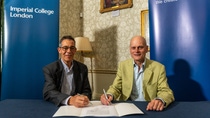
Dr Detlef Kratz (President, Group Research at BASF) and Professor Ian Walmsley (Provost of Imperial College London) sign the new framework agreement, July 2022. Photo credit: Fergus Burnett
By Emma Gregory
BASF has a long-established strategic partnership with Imperial College London and together they have recently begun a new phase to advance modern chemical production.
Darren Budd, Commercial Director BASF UK & Ireland comments, “Our partnership with Imperial College London is an important collaboration and exciting for innovation within the UK. The connection between Business and Academia is essential as we learn so much by listening to each other.”
Dr Christian Holtze, Academic Partnership Developer and Principal Scientist for Flow Chemistry at BASF, said: “We appreciate the excellent infrastructure and cutting edge-research at Imperial. The cross-disciplinary approach and the impact-driven mindset are why we’ve selected Imperial as our primary academic partner in the UK – one of a select few strategic partners worldwide.”
Take a look at the articles below to find out more.
“This research is a real opportunity to complement world-scale production with a more flexible alternative.”
Dr Christian Holtze
Academic Partnership Developer and Principal Scientist for Flow Chemistry at BASF
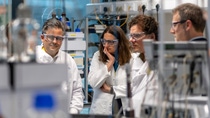
CACE 2023 Best Paper Award
Photo credit: Imperial College London/Fergus Burnett
A team from BASF and Imperial has won the Computers & Chemical Engineering (CACE) Best Paper Award 2023 for AI techniques that could boost chemical R&D.
The prestigious journal in process systems engineering rated the paper as the best of over 280 published that year. “It’s fantastic to receive recognition for work that is both academically pioneering and has important practical value to industry,” said co-author Professor Ruth Misener in the Department of Computing and the EPSRC Centre for Doctoral Training in Statistics and Machine Learning. The paper by PhD student Jose Pablo Folch and colleagues from BASF and Imperial adapts classical statistical techniques used to obtain the most useful possible information from a finite number of experiments to the specific research and development (R&D) methods used by chemical companies.
The techniques, developed as part of a wide-ranging partnership between BASF and Imperial, are designed to help R&D scientists in chemistry and other fields improve industrial processes with minimal trial and error by predicting which experiments will return the most useful results. They could also help automate the R&D process.
“Machine learning is growing fast, and in this paper we’ve shown how to apply some state of the art techniques from machine learning to chemistry. The challenge is making sure the maths actually describes the real-world problem – the collaboration with chemists and data scientists from BASF has allowed us to do this,” said Mr Folch.
“At BASF we see digitalisation as key for strengthening our role as a leader in R&D in the chemical industry, and addressing the industry’s pressing needs for sustainability and resilience. We are delighted to have received this recognition from CACE.” commented Dr Christian Holtze, Academic Partnership Developer and Principal Scientist for Flow Chemistry at BASF.
Darren Budd, Commercial Director, BASF, UK & Ireland added, “It brings me great pleasure to know that our paper was highlighted as the Best Paper of 2023 by CACE, one of hundreds of incredible examples of innovation. Collaborations between Academia and Industry are vital. I’m excited about the impact this work could have within the chemical sector.”
Read the full news release from 27 August 2024 here.
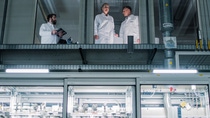
New EPSRC Prosperity Partnership
Find out more here.
Read our BASF News Release 26 October 2023 here
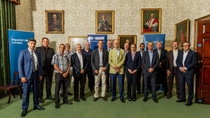
Innovation Collaboration
The wide-ranging strategic partnership is generating know-how and intellectual property to enable the chemical industries to improve their performance, sustainability, and resilience.
As one of our strategic global partner universities, Imperial is collaborating with BASF on a range of research that includes techniques to use energy and materials more efficiently and to replace fossil fuel-based feedstocks with renewable alternatives.
Find out more here.
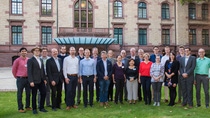
Developing Flow Chemistry
The technique could allow the chemical industry to manufacture chemicals, for example agrochemical actives, far more efficiently than they do now.
Find out more here.